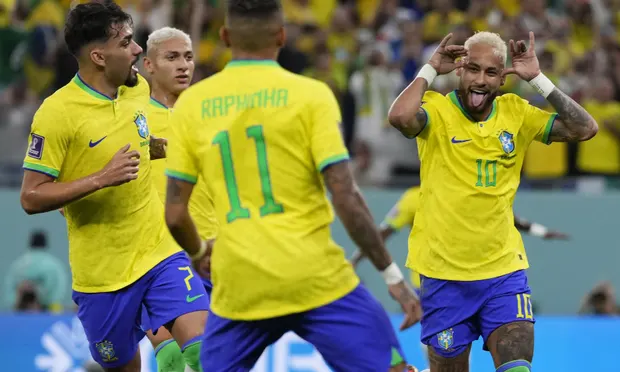Tite had just pledged to dance along with his Brazil squad, and to hell with the churls, when he alighted upon another form of visual display. “When we paint a painting, the entire painting is the athletes,” he said. “They are the ones who are portrayed in this painting and we are just participants. We just contribute to the painting; the painting is just the players themselves.”
If they are to draw a line under two barren decades, Brazil will have to master all the arts. The choreographed routines that greeted each goal against South Korea were looked upon dimly in some quarters but that is a trifling concern. The more pressing theme is whether Croatia, with their savvy and seasoned core, will allow as many opportunities for festivity when they face Tite’s players in the last eight.
The “Croatian resilience” was a theme in his pre-match pronouncements. It will be Brazil’s toughest hurdle yet by some distance: there is no chance Zlatko Dalic will tell his side to leave gaps in the manner of South Korea, who entertained but were glaringly open. Croatia will sit down, strap in and try to lead Brazil along the slow road.
“We want to score goals quickly so later we can feel more comfortable,” Tite said. But unless Vinícius Júnior, Neymar, Richarlison and their cohort can repeat Monday’s explosive start, the momentum may begin to shift glacially.
That is what happened when Croatia slowly took the wind out of Japan, eking a victory on spot-kicks for the third time in their past five knockout ties. “We have developed a mental strength and a certain consistency in extra time and penalties,” said Luka Modric, who appeared with Dalic moments after Tite.
“So if it comes to that our last match is confirmation we can do it again. We’re prepared for anything.”
Another exit at this stage would not be enough for Brazil, although a garrulous Tite showed little sign of strain. He played along with the suggestion of potential mascot status for the cat that interrupted a Vinícius press conference on Wednesday; if a particularly spicy question, usually on the topic of dancing, came his way he asked his interlocutor’s name and fired back. “I will not make comments to those who do not know Brazilian history and culture,” he told one of them. “I leave that noise aside. We will continue doing things our way.”
Dalic pointed out that a third quarter-final for a country of 3.9 million people is nothing to be sniffed at. Expectations have been raised by their performance four years ago and he equated Friday’s task with the game that proved their undoing in Russia.
“The match ahead of us will be the most demanding game; I can compare it to France in the final. It’s a great challenge for us. I wish such a difficult match was waiting for us a bit later but we’re one of the teams that has reached this stage and our ambitions will not stop there.”
In a curious climbdown, Dalic apologised for offending anyone in the winter sports fraternity who might have been upset when he said football is “not figure skating, this is a fight for a result” after criticism of Croatia’s muted attacking performance against Japan. They lack a reliable centre-forward and out-and-out pace on the flanks. Croatia are new and old: 18 of the squad were not around for their runners-up finish but five of the remainder have been heavily involved in Qatar. For the last game, Dalic named the oldest starting XI of any last-16 contender at a World Cup since France in the 2006 final.
Source: The Guardian



